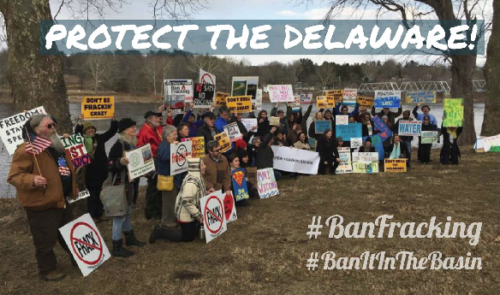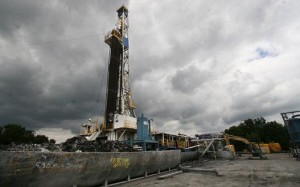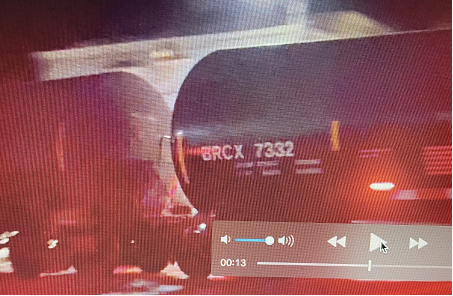
Join Us 8/26 to Demand Fracking Ban in the DRB
August 19, 2018The Fracking Industry’s Water Nightmare
September 25, 2018Download the Report as a pdf.
Read more about the report online.
Download this Media Advisory as a pdf.
See below for an Executive Summary of the Report
MEDIA ADVISORY: September 11, 2018
NEW REPORT: Secret Chemicals Used in Fracking
Organizations and Report’s Author Reveal New Research that Documents Use of Toxic Chemicals, polluting Pennsylvania and threatening the Delaware River
Trenton, New Jersey – A new report has just been released – “Keystone Secrets: Records Show Widespread Use of Secret Fracking Chemicals are a Looming Risk for Delaware River Basin, Pennsylvania Communities”, by Dusty Horwitt of the Massachusetts-based Partnership for Policy Integrity (PFPI). The eye-opening report and its critical relevance to the region will be discussed at the State House by the report’s author and organizations supporting a COMPLETE ban on fracking and frack wastewater in the Delaware River Watershed.
WHAT: Press Conference
WHEN: Wednesday, September 12, 2018, 12:00 noon
WHERE: State House Annex Steps, 131-137 W State St, Trenton, NJ 08608
WHO: Dusty Horwitt, Author of “Keystone Secrets”; Organization representatives working for a full frack ban: Jeff Tittel, New Jersey Sierra Club; Tracy Carluccio, Delaware Riverkeeper Network; Alyssa Bradley, Clean Water Action NJ; Doug O’Malley, Environment New Jersey; Lena Smith, Food & Water Watch; Wes Gillingham, Catskill Mountainkeeper.
WHY: The Delaware River Basin Commission (DRBC) has proposed to ban fracking in the Delaware River Watershed but allow the treatment and discharge within the Basin of fracking wastewater produced elsewhere, as well as water to be exported for fracking outside of the Basin. The groups are working to achieve a COMPLETE ban on fracking and its activities throughout the Delaware River Watershed and are disclosing this information about the toxic frack chemicals that are hidden as Trade Secrets to the DRBC Commissioners prior to their vote on the draft gas regulations. The groups are advocating that Governor Phil Murphy, as the DRBC Chairman, lead the Commission to ban fracking, ban frack wastewater and ban the export of water for fracking.
The future of the Delaware River Basin is at stake. If you live in Delaware, New Jersey, New York or Pennsylvania contact your governor and tell them to vote for a COMPLETE ban on fracking and related activities in the Basin.
Executive Summary of the Report
Between 2013 and 2017, drilling companies injected at least one hydraulic fracturing (“fracking”) chemical with an identity kept hidden from the public into more than 2,500 unconventional natural gas wells drilled in Pennsylvania, amounting to 55 percent of the more than 4,500 unconventional gas wells drilled in the state during the five-year period, primarily in the Marcellus and Utica shale formations. In total, companies injected secret fracking chemicals 13,632 times into 2,515 wells. Exemptions in Pennsylvania law virtually guarantee that the use of secret chemicals in the state’s oil and gas wells was higher than detailed in this report.
Records released by the U.S. Environmental Protection Agency (EPA) in response to a Freedom of Information Act request indicate that these chemicals could have serious health effects including irritation to skin and lungs, liver toxicity, developmental toxicity and neurotoxicity. The widespread use of secret fracking chemicals therefore poses serious health risks for people living near Pennsylvania’s unconventional gas wells and for 15 million people who rely on the Delaware River Basin for drinking water. Pennsylvania law suggests that in at least some cases no one – not even first responders acting in an emergency – would be able to learn the chemicals’ identities.
In the coming months, the Delaware River Basin Commission is expected to vote on plan it proposed to ban fracking in the basin – fracking that would be most likely to occur in unconventional gas wells in Pennsylvania’s portion of the four-state area. There is currently a de facto moratorium on fracking in the basin that provides drinking water for New York City and Philadelphia among other cities. The commission is also expected to vote on its seemingly inconsistent proposal to allow related activities inside the basin, including the treatment and discharge into waterways of fracking wastewater from outside the basin. Any fracking or discharges of wastewater would be likely to include some of the secret fracking chemicals discussed in this report.
Fracking in unconventional formations has significantly increased oil and gas extraction, making Pennsylvania the nation’s second-largest natural gas producer while sparking concerns about pollution and health effects, especially related to unidentified fracking chemicals. In response, Pennsylvania and 28 other states have enacted rules that require some public disclosure of these chemicals. However, most if not all of these rules have exceptions that allow companies to withhold chemical identities as trade secrets. This report by Massachusetts-based Partnership for Policy Integrity (PFPI) with analysis of fracking chemical disclosure data by Pennsylvania-based FracTracker Alliance, illustrates that drilling companies have used these exceptions extensively.
The records obtained by PFPI from the EPA show that non-disclosure of fracking chemical identities may leave people unknowingly exposed to harmful substances. Between 2003 and 2014, the EPA identified health concerns about 109 of 126 new chemicals proposed for use in oil and gas drilling and fracking. The chemicals’ manufacturers submitted information about the chemicals for review under a program that requires EPA to screen and regulate new chemicals for health and environmental impacts before they are used commercially. Despite concerns by EPA scientists about the chemicals’ health effects, EPA approved most of the 109 chemicals for use, and 62 were later used in or likely used in oil5 and gas wells. Manufacturers took advantage of trade secret protections that are permitted by federal law to conceal 41 of the 62 chemicals’ identities. “Concern for liver and kidney toxicity” read an EPA review of one chemical that the agency approved in 2013 for use in “downhole treatment of oil and gas wells.” The chemical’s identity and the manufacturer’s name were confidential.
Health problems related to secret fracking chemicals are not just hypothetical. In Amity and Prosperity, a recent book about fracking in Washington County, Pennsylvania, journalist Eliza Griswold found that several people living near fracked unconventional gas wells, a pit of drilling waste, and a pond of fracking wastewater suffered mysterious illnesses and the deaths of several animals. Yet proving a link between the health problems and the drilling operations was challenging in part because the citizens could never obtain a full list of the chemicals to which they may have been exposed, even with a court order requiring full disclosure by the company in charge of the drilling site. One of the citizens lost his lawsuit for damages due to inability to prove such a link, and the other citizens signed confidential settlements with the drilling interests they had sued that left them “feeling angry and defeated.”
The potential for fracking and related activities in the Delaware River Basin raises the possibility that millions of people could find themselves in similar situations. Without knowing fracking chemical identities, citizens and regulators could have great difficulty identifying potential pollution in water supplies or determining what contaminants to remove from wastewater. Compounding the risk is that if the trade secret claims are asserted by the chemical manufacturers as opposed to other companies involved in fracturing unconventional gas wells, Pennsylvania law appears to provide no legal right for anyone to access the chemicals’ identities, even first responders or health professionals. This exemption is distinct from the so-called “physician gag rule,” recently struck down by the Pennsylvania Supreme Court, that required oil and gas companies to provide secret chemicals to health professionals in certain situations but prevented the health professionals from sharing the information.
Mapping of secret fracking chemical injection sites shows that use is heaviest in southwest Pennsylvania near Pittsburgh and in northeast Pennsylvania near the Delaware River Basin, tracking areas of intensive drilling. A county-by-county table shows that Washington County had the highest number of wells fractured with at least one secret fracking chemical, while Susquehanna County was second. A table of well operators shows that Range Resources injected the most publicly reported secret fracking chemicals of any drilling company. The use of secret chemicals is likely even higher than detailed in this report because of exemptions in Pennsylvania law, including no disclosure requirements for the chemicals used in drilling oil and gas wells – the portion of the oil and gas extraction process that precedes fracking, no requirement that fracking chemicals for so-called “conventional” oil and gas wells be reported to an easily searchable electronic database, and the reporting exemption for chemical manufacturers.
Recommendations include a ban on fracking and related activities in the Delaware River Basin and changes to Pennsylvania law to require disclosure of all chemicals used in fracking and drilling oil and gas wells. The public has a right to know the identities of chemicals used in oil and gas operations so that citizens, first responders, regulators and scientists can determine the chemicals’ risks and act to protect health and the environment.




